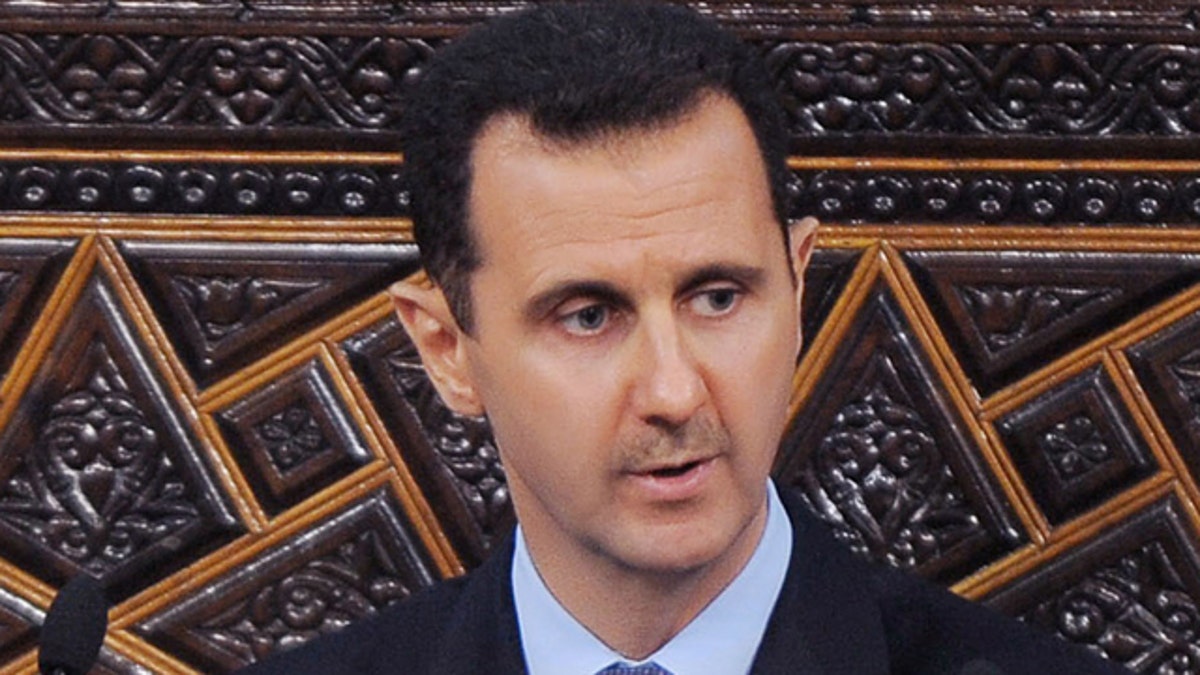
March 30, 2012: Syrian President Bashar Assad addresses the Parliament, in Damascus, Syria. (AP2011)
Amid economic sanctions imposed by the U.S. and other Western democracies to pressure Syrian President Bashar al-Assad to end his brutal eleven-year reign, the United Nations has quietly agreed to extend its current development partnership agreement with the Assad government, which was set to expire this year.
The decision, made “in the light of recent developments,” according to a document obtained by Fox News, “will permit the United Nations organizations to better assist the country in addressing the impact of current events and their socio-economic consequences.” The renewal apparently lasts through 2012.
The U.N. move comes despite the fact that the leading U.N. agency in the country, the United Nations Development Program (UNDP), announced in April that it was “deferring” a new, five-year country program for Syria, extending from 2012 to 2017, amid the rising turbulence in that country against the Assad dictatorship.
UNDP serves as the coordinator for all joint U.N. programs in Syria, as in most other developing countries. UNDP’s top representative in Syria, Ismail Ould Cheikh Ahmed, is also the chief U.N. official in the country, known as the Resident Coordinator. In a message on the U.N. Syria website, Ahmed emphasizes that the U.N. is a “strong partner to the Syrian Government.”
News of the current U.N. program extension was tucked into a document presented to the 36-nation Executive Board that oversees operations of UNDP, the U.N. Population Fund (UNFPA) and the United Nations Office for Project Services (UNOPS), at a semi-annual session in early July, extending current programs in both Syria and Egypt. (The U.S. is a member of the Executive Board, and so is the Assad regime’s biggest supporter, Iran.)
While it refers in its headings only to UNFPA, the text of the Executive Board document specifically affirms that the U.N. as a whole agreed with the Assad regime on the extension to what is known as the United Nations Development Assistance Framework, or UNDAF, for Syria, even as it also observes that Syria is “facing a challenge with the wave of unrest that has spread throughout the country.”
(According to UNDP’s spokesman, the UNDAF is “the strategic program framework that describes the collective response of the U.N. system to national development priorities.” But U.N. agencies in Syria also have a strong influence on the national programs they subsequently claim to respond to. As U.N. Coordinator Ahmed noted in a letter to U.N. Secretary General Ban Ki-moon last February the U.N. country team in Syria “worked closely with the Government on their 11th Five Year Plan, providing consultancy services, situation analysis and strategies, targets and support to develop policies, programs and projects.” )
Ultimately U.N. programs described in the UNDAF are usually executed by the national government under U.N. supervision and monitoring.
In other words, U.N. agencies influence both the government’s input and output.
Among other things, the UNFPA documents note that the Assad government “has introduced a comprehensive reform package” that “embraces various spheres” including youth employment, and says that the one-year extension will allow UNFPA, for one, to “create an enabling environment to empower youth and enable them to participate in decision-making and planning at central and local levels.”
That enabling environment has apparently not yet filtered down to the throngs of predominately youthful protesters who continue to brave often-savage repression at the hands of Syrian police and security squads.
As many as 1,600 protestors have reportedly been killed in Syria since the upheavals began, and some 26,000 have reportedly been arrested.
Most of UNFPA’s current programming, according to an agency spokesman, even while becoming more focused on emergency issues during the current crisis, focuses on maternity care and health, as well as contraceptive and “reproductive health care.”
Getting information on the full panoply of U.N. operations in Syria is also difficult, due both to the fragmented nature of U.N. funds, agencies and programs, and the often chaotic situation in Syria itself.
The World Food Program, for example, which operates more as an emergency relief agency, has three different programs in Syria offering assistance to just under 669,000 people.
In all cases, however, U.N. agencies work closely with Syrian government agencies, which can range from the health and education ministries to such entities as the Ministry of the Interior, which among its tasks includes control of security forces.
Asked directly by Fox News to confirm the most recent U.N. program extension in Syria, a spokesman for UNDP sidestepped the question, noting instead that “U.N. regular operations have slowed down significantly due to the situation on the ground,” as have UNDP operations.
Otherwise, he said, “U.N. agencies are providing humanitarian support in response to the crisis including providing health and child protection services, food and nutrition, hygiene kits and psychosocial support.” Additionally, “other joint activities with direct impact on the vulnerable and poor are continuing though at a much slower pace.”
Among those continuing activities are a joint UNDP and UNFPA program to “monitor the social aid fund of cash assistance to Syrians living below the poverty line,” and a six-agency effort to provide health and education services, food and jobs in six of the poorest villages in Syria.
The social aid fund in particular is not a small item. According to documents examined by Fox News, the “Social Welfare Fund” that UNDP monitored under the now-extended UNDAF was intended to dispense $192 million a year between 2008 and 2012.
And according to U.N. Coordinator Ahmed’s February report to his boss, the Secretary General, the entire UNDAF program that has now been extended had “weak monitoring and evaluation systems, which made comprehensive assessment of U.N. achievement in Syria very difficult.”
George Russell is executive editor of Fox News and can be found on Twitter @GeorgeRussell.
